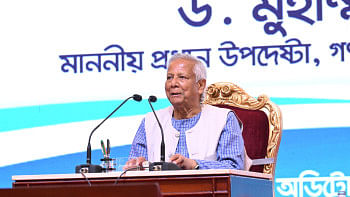What's in a maiden name?
Throughout history, very few women have discarded the traditional practice of adopting the husband's surname upon marriage. In recent days, however, deviating from the mainstream, women are increasingly retaining their maiden (birth) names. A natural question arises: why would a woman assume the husband's surname, if at all?
Keeping the Name
Women who opt to keep their maiden names cite “identity” or “individuality” as the primary reason for doing so. Changing any part of the name after growing used to it for years seems daunting to many young women who also view this practice as an assault on their self-identity. “I consider myself to be an individual. I am a separate person even if I am married,” asserts Prianka Ball, a Bangladeshi currently studying at Bryn Mawr College (USA).
This contentious issue is an integral one in feminist culture with most feminists rallying support for retaining the maiden name. The reason is simple: how many men consider changing their surnames upon marriage?
 While there have been instances when men changed their birth names, the number is still insignificant globally. In the United States of America, for example, only eight states recognise the name-changing process of a man legally. Some women find this act as a “form of ownership” that undermines equitable power dynamics within a relationship.
While there have been instances when men changed their birth names, the number is still insignificant globally. In the United States of America, for example, only eight states recognise the name-changing process of a man legally. Some women find this act as a “form of ownership” that undermines equitable power dynamics within a relationship.
In a counteractive attempt, feminists suggest couples to assume either a surname that merges both of their birth names or a new surname altogether whereby both the parties have to let go of their birth names.
Other women have identified gender-neutral reasons, such as the time-consuming and exhausting paperwork associated with changing a name. At a time when employers look into the online presence of job-seekers before making hiring decisions, changing the surname will also mean that all your previous work associated with your name will not show up in online searches.
Some women have a special liking for their maiden names. “Chowdhury- they claim to be the past landlords; why lose it?,” quips Sifat Chowdhury, who is currently studying Business Administration at North South University.
Fatema Jannat, who studies Economics at North South University, has a more far-sighted approach to the issue. “What if, God forbid, my marriage doesn't work out? I can't keep changing my surname constantly!” she says. Before you shrug it off as undue skepticism, please be aware that this is the reality for some women who revert to their maiden names after re-marriage, divorce, or death of the husband.
While the concept of changing the surname upon marriage is attributed to religion, many women are quick to point out that it does not originate from Islamic customs. Feminists believe it is still widely practised in South Asia because many women in the region are unable to resist the pressures of a misogynist culture.
Dropping the name
There are quite a large number of women who would differ. In the United States alone, over 90 per cent of women drop their maiden names. Apart from viewing it as a way of honouring ancestral traditions, many women also see it as a means of identifying with the husband and feeling a sense of belonging to the new family.
Chowdhury Tazrian Ishrat, who studies Business Administration at North South University, explains: “Taking the husband's name is romantic! The child is never given the mother's surname. If there are no issues regarding that, then there shouldn't be any with taking the husband's name either!”
Some women try to break free of the latter tradition by passing on either their merged surnames or their maiden names to their children.
In addition, there are women who are not too fond of their maiden names because of the spelling errors, mispronunciation, or assumptions (regarding ethnicity, religion, etc.) that the surnames invite. They are keen on changing names at the next best opportunity that usually happens to be marriage.
While the debate continues, few women have qualms with either of the options. It is fair to say that the decision to keep or drop the maiden name should be a conscious one made with a deep understanding of the implications.

 For all latest news, follow The Daily Star's Google News channel.
For all latest news, follow The Daily Star's Google News channel. 



Comments